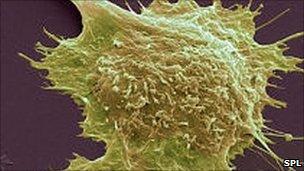Bowel cancer screening cut off 'misses cases'
- Published

Further tests can diagnose potential tumours picked up by screening
Cases of bowel cancer may be missed because of the cut off level used with the current NHS screening test, suggests.
Taiwanese researchers found they could tell if a person was likely to develop bowel cancer even when the screening test had been negative or "all clear".
They say it may instead be better to use the test - that looks for traces of blood in the faeces - to define people as low, intermediate, and high risk.
UK experts still back the screening.
Put to the test
In 2006, the NHS bowel cancer screening programme for England was introduced to find early tumours in people in their 60s and was extended last year to include people up to the age of 75.
People who are eligible receive a faecal occult blood testing kit in the post, that they complete and send off to the lab. A couple of weeks later they will receive a letter in the post about their results.
Around two in 100 people will receive an abnormal result. They will be referred for further investigation.
The others will receive a "normal" or negative result and will be returned to routine screening - they will continue to be invited for bowel cancer screening every two years while they are still within the eligible age range.
But the latest research suggests it is possible to hone in on these so-called normal results and tease out a better idea of future cancer risk.
The team from Taiwan, led by Hsiu-Hsi Chen from the National Taiwan University in Taipei, looked in detail at the test results of over 44,000 people in their country who had received a normal result after screening.
When they followed up these people who screened negative to see how many went on to develop bowel cancer, they found they were able to see early warning signs in the apparently "normal" test results.
Every test result gives a value, saying how much blood can be detected. Currently, doctors set a cut off value of 100ng per ml to determine if the result is normal or abnormal. Test results reading higher than this level are deemed "abnormal" and mean the patient needs more investigation.
But Dr Chen's team found values below 100ng/ml, which would be classed as normal, could still provide a warning of imminent cancer, especially those falling just under this cut off.
They say it is possible to rank these "normal" results as low, intermediate, high, and extremely high risk groups, and would mean patients could be offered more tailored screening.
For example, those with borderline results around the 100ng/ml should be offered more frequent screening while those with virtually no detectable blood could be seen less often.
- Published23 March 2011
- Published5 March 2011